The story of Felt – Lawrence recalls their trip into indie folklore and draws a line under the 80s’ definitive cult band
In a parallel universe they became as big as The Smiths off the back of ten albums that spanned a decade
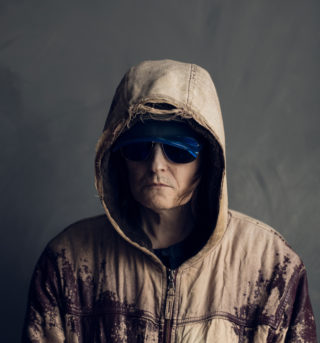
In a parallel universe they became as big as The Smiths off the back of ten albums that spanned a decade
Water Orton is a strange place to start a story about pop music. If it wasn’t for the railway station slap bang in the middle of it, then you’d struggle to imagine much happening there at all. As a kid, I’d often pass through it on Saturday jaunts from Nuneaton to Birmingham, and the impression I had was that the industrial revolution that swept through the rest of the midlands gave up when it met the sleepy red brick houses and swaying oak trees. I had no idea that one of Britain’s most enigmatic and beloved underground bands started out from a small village in North Warwickshire.
“Maurice Deebank also lived in Water Orton and that’s probably one of the luckiest breaks I’ve ever had,” smiles Felt’s frontman Lawrence as he thoughtfully sips tea from a paper cup in his East London flat. “Maurice was in the year below me at junior school and he had classical lessons. I’d see him go in and think, ‘ah, that kid plays the guitar.’ One day I got him around to tune my guitar because at that point I couldn’t tune up. He tuned it in a few seconds and started playing ‘Mr Tambourine Man’. Immediately I said: ‘what’s that? – it’s amazing?’. It was just three chords, but it totally blew me away.”
Felt are one of the great mysteries of the 1980s. Informed by a love of Tom Verlaine, Television and Lou Reed, they spent the entire decade creating sweet, minimalist pop that mixed well-spoken lyricism with gorgeous, radio-friendly melodies. At their head, lead-singer Lawrence combined shy, bookish good looks with fierce intellectual intensity; his self-proclaimed ‘new puritan’ philosophy eschewing alcohol, tobacco and drugs in a peculiarly English take on straight edge. By rights, they should have been as big as The Smiths, but somehow it never really happened for them.
Despite the weight of history and unfulfilled ambition, Felt made a difference nevertheless. “I think we were forerunners, and when you’re a forerunner then it’s your job to pave the way for the people who come later,” Lawrence tells me magnanimously. “I think if we’d started in 1990 rather than 1980 then we would have been on the TV and in the charts. I’m convinced that ‘Primitive Painters’ would have been a top 10 single and we would have been a big band, but you know, timing is everything. Looking back now, I can say I’m happy with the position that Felt got to, but at the time it was frustrating.”
Felt was always a band that was going to break the rules. Spending time with Lawrence you find that behind the warm smiles and self-deprecating sense of humour burns fierce ambition and a determination to do things his own way. Take ‘Index’, Felt’s first single, for example. It was bedroom pop before bedroom pop was even a thing. Self-produced by Lawrence and recorded on a portable cassette player, its stripped-back, deeply impressionistic style set it apart from the big, brash sounds of punk, ska and heavy metal that filled the local pubs and clubs.
“Punk was an interesting time for me,” Lawrence explains when I ask him about his experiences in Birmingham’s anarchic punk scene. “On one hand, it drew a line in the sand and said, ‘now everyone could join in,’ but on the other, it led to a near disaster. Too many people joined in. You had people who perhaps shouldn’t have been there who had made that leap, and it felt a bit too crowded by the time I got there.”
The subject of punk in Birmingham clearly throws up mixed feelings for Lawrence. Even though he was inspired by the energy and DIY attitude of the city’s punk scene, he’s also equally keen not to be defined by it. “Birmingham was very traditional,” he tells me, recalling his time watching bands like Misspent Youth and Swell Maps. “Heavy metal was invented there and almost everywhere you went all that the pubs would play was heavy rock and RnB. There was nothing that fed into books, arts and films, which is what I wanted to do. The closest was probably The Prefects. They had really great lyrics when you could make them out, and you knew that Robert Lloyd was a really great writer.
“By the time I started making music, I’d already told myself that I wasn’t going to be part of any local scene. We didn’t want to be in some incestuous local scene where we’d have to be friends with all the other musicians. I didn’t know anybody and I didn’t want to know anybody. No one even knew we were from Birmingham when we first played there; people used to think Felt was from London.”
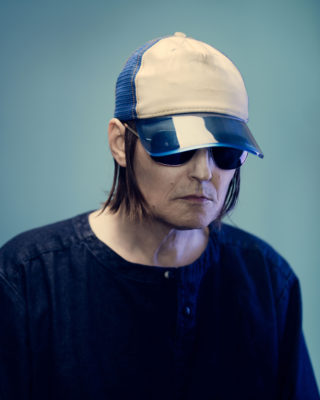
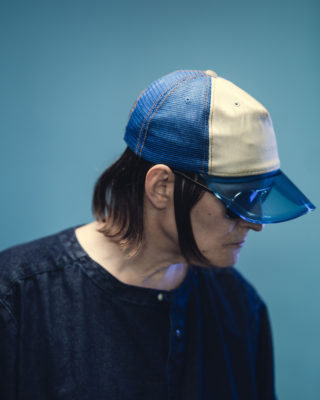
By 1980, the first version of Felt was starting to assemble from musicians and schoolmates living in or around Lawrence’s village. Adding guitarist Maurice Deebank and drummer Tony Race, the band was fiercely committed to realising Lawrence’s vision and, according to legend at least, his control over the group was absolute. The band practised relentlessly. “To me the worst criticism is to be called ramshackle,” he says, suddenly becoming more serious. “I love being professional. I want to be professional. I’m an amateur in a professional world.”
Felt’s major innovation was a joyous, feather-light guitar sound that deliberately rejected the scuzz and distortion of punk. Alongside the work of bands like Aztec Camera, Pylon and REM, the band’s unique sound ended up becoming a standard for the ’80s jangle pop revival. Melding the duelling, wire-like guitars of their heroes Television, Felt’s rejection of almost any effects or distortion led to a lush, ’60s style brightness. “Maurice was definitely the better player, as he’d had classical lessons,” recalls Lawrence. “My favourite thing in the world is guitar solos when they’re done properly; it’s because of ‘Marquee Moon’ I suppose. Originally, Felt was going to be all guitar solos and this guy had the credentials to do it. We had an HH transistor amp, which was a bit against the grain as bands like Orange Juice were really into their valve amps at the time, but we loved it. It only had ‘light’ and ‘heavy’ settings. So that’s the secret: the HH 100 Watt amp on the light setting. That was our sound.”
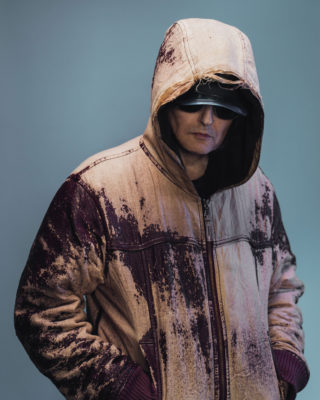
With a line-up sorted and a collection of songs written that they could play in their sleep, it was time for Felt to play their first gig. However, in typical no-compromising style, there was no way they were going to support some random band on a Birmingham pub bill. Lawrence was resolved that Felt got off to the kind of start that would make the history books, and it was a fan letter of all things that netted the band their first big break. “Nick Gilbert (Felt’s bass player) and I were big fans of The Fall and he wrote him a fan letter asking him questions about the songs. Right at the end, he said ‘by the way, we’re also in a band.’ The funny thing was Mark E Smith actually wrote back. It was the usual, thanks for your letter blah, blah, blah, and then he said ‘why don’t you come and support us? We’re playing two nights in Manchester next month’ and we just couldn’t believe it. It was the dream beginning.
“We played a place called the Cyprus Tavern and we were first on. I’d never been on stage in my life. I was nervous, but I was also thinking I have to get this right. We played a short set – we had about six songs – and when we came off stage The Fall all ran over to us going ‘fucking hell, you’re amazing – where the hell have you been!?’ Their manager was saying, ‘come and play with us tomorrow, we’re playing Liverpool and then we’re playing at the Marquee in London.’”
Soon after, Felt continued with their letter writing campaign and managed to net themselves a few big club shows in London, as well as an interview in the legendary Sounds magazine. All this pricked up the ears of Mike Alway, who had been brought in by Cherry Red Records to move their roster away from reprints of American bands like the Dead Kennedys and The Runaways. Felt’s skewed and highly unconventional take on classic English pop fitted in perfectly with Alway’s equally quirky internal dreamworld of carousing aristocrats and public school shenanigans and he was keen to get the band on board.
The group had big plans for their debut album. According to the statement on the ‘Crumbling of Antiseptic Beauty’ reissue, Lawrence’s ambition was to release the best debut album ever. “The beginning period was over and we had to really deliver – we were great and the songs were amazing and we had it all but we chose the wrong producer,” Lawrence explains. “We were going to do it with a guy called Adrian Borland who was in The Sound. He phoned up right at the last minute and said, ‘we’re going on tour, I can’t do it’, so I had to quickly revise our plans.
“It would have been a different album – he would have been a sympathetic ear and would have really got the guitar sound,” says Lawrence. “We ended up going with John Rivers because he’d done the Swell Maps album. He became our producer afterwards, but at that point, he didn’t get us at all. He’s a great producer and it’s not his fault, we were very young and we needed a lot of guidance. We didn’t know how to make a record, so reality really hit home at that point. I’d wanted us to make the best English album ever and we didn’t do it. That really hurt. People liked it, and I loved the songs, but I know what they sounded like in the bedroom with Maurice and we didn’t capture that sound.”
I ask if he’d ever been tempted to remix the album. “Straight away,” he shoots back. “In those days, you could either hire the tapes or you could buy them, so if you were on a major label, you would obviously buy the types, but on an independent label sometimes you would hire the tape off the studio and once you’d made a production master the studio would use the tape again. Of course, I didn’t know this at the time, so I rang up John Rivers’ studio saying can I get the tape, I’d like to remaster parts of it, and he said, ‘oh, you’re too late – I’ve already gone over parts of it.’ I was so annoyed.”
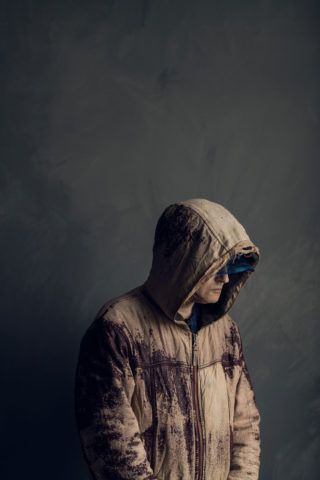
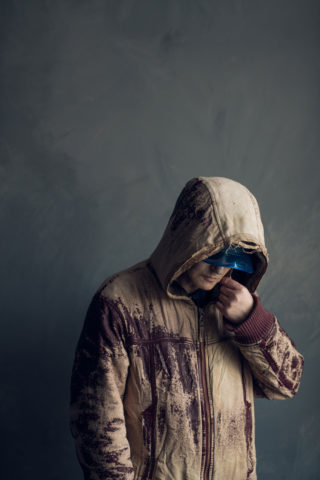
Felt went on to make ten albums and ten singles for Cherry Red and Creation during the 1980s, before succumbing to internal friction. Despite being hailed as one of the greatest underground groups of modern times, the band have left a Helen of Troy-like legacy. They went on to be one of the cornerstones of the British indie scene, inspiring the look and feel of bands like Belle and Sebastian and Camera Obscura, while former members went on to become respected musicians in their own right. Deebank released acclaimed solo albums and keyboardist Martin Duffy became one of the founding members of Primal Scream. Lawrence went on to form the ’70s-inspired Denim in 1992, before putting out his own solo work under the name GoKart Mozart.
“The only thing that didn’t happen with Felt was success,” laughs Lawrence. “I’d always wanted to just do ten years. I remember telling Maurice once and he just said, ‘what are you talking about?’ I decided to keep quiet about it after that, but always in my mind, the plan was to exist for a decade. I hated the ’80s, so I only wanted to be part of that decade as an antidote to what was around – all those big famous bands. I wanted to be a big underground band. I wanted to take the underground, overground.”
Since 2014 Lawrence has been slowly collecting, remastering and re-examining Felt’s output. This has culminated with Cherry Red confirming a major re-release of the group’s first five albums in February of next year. Alongside, new pressings of the records, you’ll also find a collection of memorabilia, gig posters and a couple of badges for your backpack and duffle coat.
“It’s an exercise in narcissism really,” admits Lawrence with a sheepish grin. “I wanted to do a proper overview and revisit a few things so I could or at least put these records out as I’d originally intended them to be. ‘Ignite the Seven Cannons’ [the band’s fourth album, from 1985] for example, I never liked because you couldn’t hear most of the songs. They were just like mood pieces, covered in reverb, but I knew that they were brilliant songs. Luckily, I remembered what had happened with the first record and I stole the master tapes so we could remix it later.”
Viewing it as the last word on Felt, Lawrence is keen to look forward. Next year will also see him release 17 new songs with GoKart Mozart on his West Midlands Records label. Called ‘Mozart’s Mini Mall’ it sees him adopting the persona of ‘the sardonic Lucifer’, a character the press release describes as ‘pin-pricking his way through a myriad of absurd scenarios while dragging a bin-bag of pomposity and injustice to the council tip of songdom.’ Also due for release in February, Lawrence intends it to be the final record in a cycle of GoKart Mozart records he started back in 1999.
“Who is there from my generation who is still making good music?” he asks me as we talk about the new record and his future plans. “Is there anyone out there who isn’t resting on their laurels and making new music? Tom Waits maybe, he’s still doing it. Artistically, he stands alone.
“I want to be the Picasso of pop,” he proclaims as he finishes off the rest of his tea. “Picasso was painting brand new stuff right into his ’80s. He never went back to his blue period. Really, I’m more like a painter than a musician. Musicians rest on their laurels, play their old songs but stop making great new albums. But painters keep struggling and pushing forward.
“I’m trying to put myself in the same category of Lou Reed and Tom Waits. I still want to create, invent and not look back – that’s the kind of artist I want to be,” he says before surrendering to an urge to crack one more joke. “Mind you, I wouldn’t mind having some of the money that comes with it as well.”